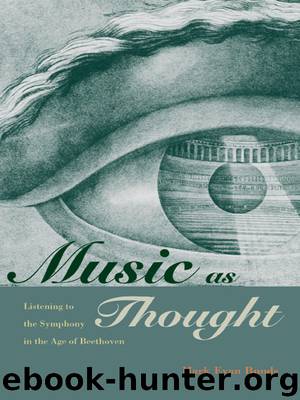Music as Thought by Bonds Mark Evan

Author:Bonds, Mark Evan
Language: eng
Format: epub
Publisher: Princeton University Press
Published: 2008-07-27T16:00:00+00:00
Anti-Semitism also increased markedly during the post-Napoleonic era. As the outlines of a German state began to take shape, the need to define national identity by means other than language took on more immediate significance. At the 1817 celebrations marking the three hundredth anniversary of the Reformation, the crowd at the Wartburg castle listened to speeches about German unity, heard Jews denounced, and burned “unGerman” books. One of the speakers on this occasion was Jacob Friedrich Fries, professor of philosophy at the University of Jena, who a year earlier had published a pamphlet calling for the exclusion of Jews from German national life.21
The conception of Germany based on race and territorial prowess would eventually overwhelm—catastrophically—the ideal of an essentially cultural nationalism. Yet we must resist reading aspirations of cultural nationalism in the early decades of the nineteenth century as doomed to failure. Jahn’s emphasis on massive, synchronized movement represented only one approach to the question of how the individual might best relate to the state. Goethe’s image of the state as a double orchestra, with each specialized player contributing a distinctive voice to the larger whole and others waiting to join in, reflects an altogether different conception of society, based on the autonomy and cultural development of the individual. Both models would be pursued throughout the nineteenth century and well into the twentieth.
Music played a central role in the model of nationalism based on individual autonomy, for it was during the early nineteenth century that music came to be recognized as an important element in the formation of German national identity.22 Friedrich Rochlitz, in the first volume (1799) of his newly established Allgemeine musikalische Zeitung, expressed his “dreams” for a history of recent music that would be constructed not along the lines of the accomplishments of “worthy individuals” but instead along the lines of the “education [Bildung] of a nation, for example, that of the Germans, toward this art.”23 A year later an anonymous author writing in the same journal argued that the state had an obligation to promote the arts, pointing to ancient Greece as an example and maintaining that music, more than any other art, penetrated to the deepest essence of man. Music was far more than “merely a means to fight ennui, or a harmful titillation of the sense”; it was a means of shaping the character (Charakterbildung), which in turn carried with it significant benefits for domestic and public life.24 An advertisement in Berlin’s Vossische Zeitung on 13 June 1801 announced the publication of quartets by Haydn and Mozart as part of a “patriotic plan” that would present to “the admirers of true music the classical works of our German (and universally acknowledged) fathers of music as monuments to the honor of German art.”25
Johann Nikolaus Forkel’s biography of Johann Sebastian Bach (1802)appeared within this context of growing national consciousness. Early onin his account, Forkel suggested that Bach’s “classic” music was immuneto changing fashions and that his works could be studied for the benefit of both “learning
Download
This site does not store any files on its server. We only index and link to content provided by other sites. Please contact the content providers to delete copyright contents if any and email us, we'll remove relevant links or contents immediately.
Aircraft Design of WWII: A Sketchbook by Lockheed Aircraft Corporation(32280)
The Great Music City by Andrea Baker(31916)
Call Me by Your Name by André Aciman(20491)
The Secret History by Donna Tartt(19048)
The Art of Boudoir Photography: How to Create Stunning Photographs of Women by Christa Meola(18612)
Shoot Sexy by Ryan Armbrust(17720)
Plagued by Fire by Paul Hendrickson(17403)
Portrait Mastery in Black & White: Learn the Signature Style of a Legendary Photographer by Tim Kelly(16996)
Adobe Camera Raw For Digital Photographers Only by Rob Sheppard(16969)
Photographically Speaking: A Deeper Look at Creating Stronger Images (Eva Spring's Library) by David duChemin(16679)
Ready Player One by Cline Ernest(14639)
Pimp by Iceberg Slim(14484)
Bombshells: Glamour Girls of a Lifetime by Sullivan Steve(14052)
The Goal (Off-Campus #4) by Elle Kennedy(13655)
Art Nude Photography Explained: How to Photograph and Understand Great Art Nude Images by Simon Walden(13031)
Kathy Andrews Collection by Kathy Andrews(11812)
The Priory of the Orange Tree by Samantha Shannon(9060)
The remains of the day by Kazuo Ishiguro(8969)
Thirteen Reasons Why by Jay Asher(8893)
